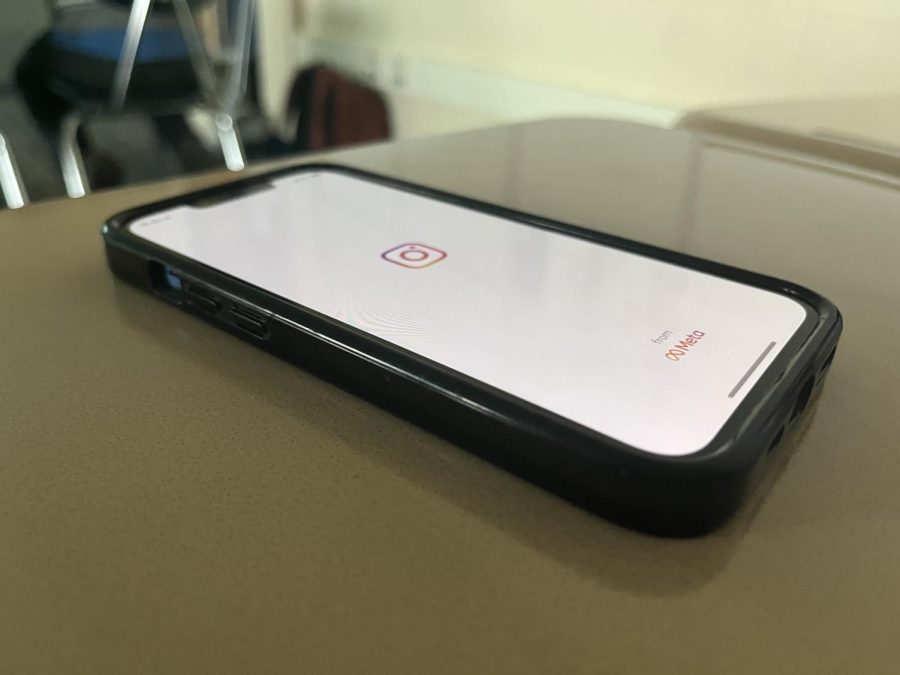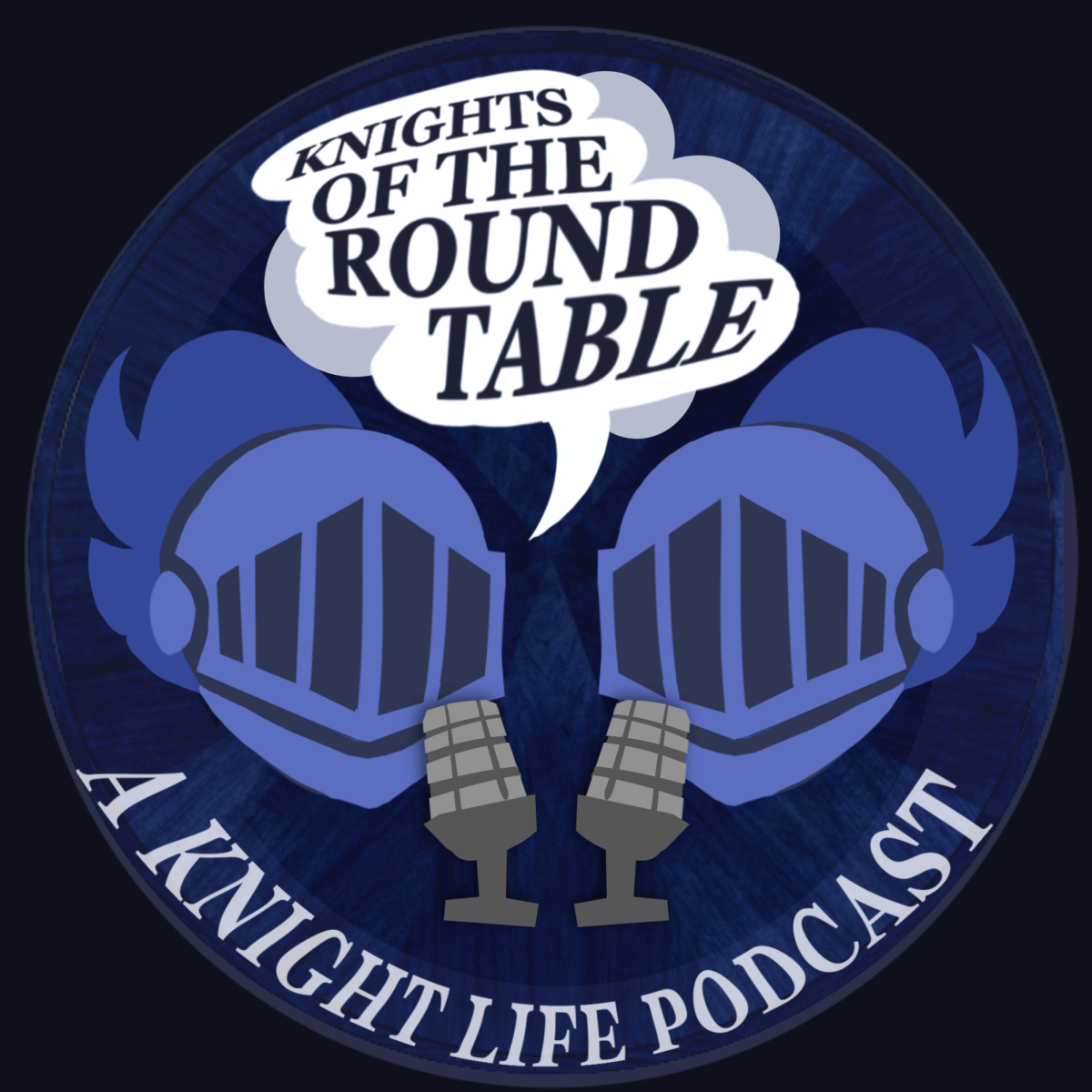Avoiding social media: six fun alternatives to improve your quality of life
Credit: Lexi Tuley
A phone sits on the table with the Instagram loading screen. Instagram is one of the most popular social media apps among teens.
May 15, 2023
Phones are practically a necessity in modern-day America. They allow easy communication between people, access to an incredible amount of information and are generally an easy place to spend time with the thousands of mobile games, television apps and social media apps.
They help a lot, but they can also hurt a lot. Increased anxiety and depression, withdrawing from family and friends and problems sleeping are all common side-effects of excessive phone use.
A report done by Common Sense found that teens spend around 2 hours and 10 minutes on social media daily, this translates to about 15 hours and 10 minutes weekly.
Getting off your phone can be hard. Apps like Tik Tok, Twitter and Instagram are designed to be addictive and to keep you scrolling. The more time you spend on the app, the more money the company will make, with little concern for the well-being of their users.
Social media especially is a huge source of teen mental health problems. The American Academy of Child and Adolescent Psychiatry found that 51% of teens visit a social media site every day, and with all the negative effects these sites can have on a teenager’s brain, it’s concerning how much time teens are spending on social media.
In an NPR article Mitch Prinstein, the chief science officer at the American Psychological Association, talks about these possible negative effects.
According to Prinstein, excessive social media use can mess with teens’ brain development, leave them feeling lonely because of the impersonal nature of social media and make them associate dangerous behavior with positive feedback.
Teens see their peers doing illegal or dangerous things – like shoplifting or drinking – and then see all the likes and comments that behavior has, and they become more likely to participate in it.
Social media can also do a lot to harm a person’s self-image. Seeing people’s curated feeds online shows only, as Rae Jacobson puts it in her article Social Media and Self-Doubt, the “highlight reels” and conceals “the merely ordinary aspect of day-to-day life.” Social media users don’t see the normal human struggles people experience, only the perfect and envious aspect of someone’s life.
These “highlight reels” can leave teens feeling less than, or insufficient compared to their peers and friends.
People usually don’t like being told to get off their phones, but in truth, it can do a lot to help your mental health. There are a lot of different things a person can do to get off social media. This list is meant to cater to students and teens whose interests don’t always align with the rest of the world.
Watch a movie / TV show
Even though a movie or TV show requires a screen to watch, it’s still better for a person’s mental health than doom-scrolling on their phone.
In the words of Dante Caloia, writing for the Queen’s University Journal, “Social media has taken over our attention spans through quick and instant gratification affecting our brains’ ability to focus on anything else we feel is less interesting.”
Without the constantly changing sensory input you get from social media and other apps, a movie or TV show helps you undo the damage to your attention span done by your phone. Plus, there are so many different types of shows out there and it would be really hard to find something you don’t like. Not to mention you can enjoy a good movie or TV show with a friend.
Go on a walk
“Go outside” is one of the many things that teens often get told to do instead of being on their phones, but the outdoors can be pretty boring if you have nothing to do. Going on a walk is a great way to be outside and have something to do. You could have a destination, or not, it doesn’t matter. You can walk to a friend’s house, a store nearby, your local park, or just go where the wind takes you.
Play a video game
Video games are one of the things that parents try the hardest to get teenagers to avoid, but they can be a great way to get off social media and connect with people.
Obviously you shouldn’t play video games for hours at a time, but spending time playing online games with friends, or single-player games by yourself can be beneficial.
The American Psychological Association lists better spatial navigation, better memory and perception, and better reasoning as some potential benefits. Pulling yourself away from your phone to play a game that you enjoy will almost always make you feel better than spending that time scrolling through a bunch of mindless images.
Read something
Reading something, doesn’t matter what it is, tends to be pretty good for a person’s mental health: novels, graphic novels, comics, magazines or newspapers. You could go to a library – KPS student IDs also function as library cards – or your local bookstore to pick something up that might seem interesting.
For people who don’t like reading very much or struggle with reading, try audiobooks. Audiobooks may be a good option for you if you have dyslexia, impaired vision or trouble focusing on one thing for extended periods of time, since they free your hands and eyes to focus on something else.
The range of genres and subjects in books is huge, and there are many options when deciding what you may want to read.
Try a new hobby
There are lots of different hobbies and activities you can do to occupy your time rather than spending it on your phone. There are different types of art you could try, like drawing, painting, sculpting, crocheting or knitting..
If you aren’t into art you could try cooking, gardening, stargazing, or hiking. You may even want to try bird-watching.
A lot of people have turned their hobbies into careers: successful artists, coders, gardeners, and authors all had to start somewhere.
Play a table-top game
There are plenty of different kinds of games to play when you’re bored: card games, board games and role-playing games (RPGs). You could play a single-player mystery game or work with a group of friends to accomplish a collective goal.
There’s also competitive games where you work against opponents to win the game. Playing a basic card game like Go Fish or a more in-depth RPG like Dungeons and Dragons not only pulls you away from your phone, but allows you to connect with others.
There are settings programmed into your phone to help limit your screen time. You can set time limits for specific apps to make sure you don’t spend an excessive amount of time there. There are free apps, such as ScreenZen, that help you more precisely regulate your screen time.
You can find these apps by searching “screen time” or something similar in your phone’s app store.
Completely ridding yourself of your phone and social media probably won’t happen, and it doesn’t need to, but it’s important to make sure it doesn’t take up too much time in your day and too much space in your thoughts.












